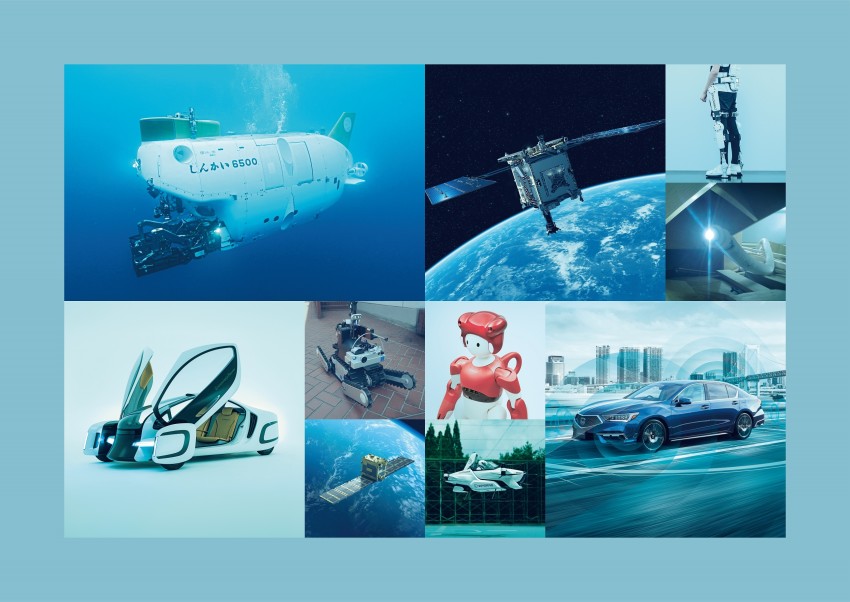Society 5.0 Expo showcases Japan’s advanced technologies

The Cabinet Office on Thursday launched the Society 5.0 Expo jointly with the Japan Agency for Marine-Earth Science and Technology (JAMSTEC) at Tokyo Skytree Town. This is expected to be Japan’s first major expo to focus on Society 5.0. The expo will also be viewable online with multilingual explanations for the global audience.
The expo will showcase the Society 5.0 concept proposed by the Japanese government as a highly desirable future society. The concept envisions the creation of a human-centered society in which all industries and other areas of society adopt AI, IoT, robots, big data and other innovative technologies to overcome critical challenges. The Cabinet Office’s 6th Science, Technology and Innovation Basic Plan covering fiscal 2021 to 2025 sets forth the direction of science, technology and innovation policies to secure sustainability, resilience and the well-being of diverse individuals.
The expo will present achievements being realized through national projects focused on increasing innovation in society, including the cross-ministerial strategic innovation promotion program (SIP) and the ImPACT program for stimulating high risk, high-impact R&D. Japan’s scientific and technological aspirations will be conveyed through numerous displays of advanced technologies.
Specifically, some 50 leading Japanese companies, universities and organizations will exhibit approximately 200 products and research achievements that are expected to contribute not only to Society 5.0 but also the U.N.’s Sustainable Development Goals. The exhibits will cover fields such as mobility, healthcare and caregiving, manufacturing, agriculture, food, disaster prevention and energy, including:
• Asteroid-explorer Hayabusa2’s returned capsule
• Full-scale model of SHINKAI 6500 submersible piloted to 6,500 meters undersea
• SkyDrive flying car
• Honda Legend Level-3 autonomous vehicle with high-definition 3D mapping
• Model of small synthetic-aperture radar satellite system for on-demand launches and instant observation
• HAL wearable cyborg that transmits brain signals to human muscles for assistance with physical functions
• Disaster-prevention systems for heavy rain and tornado forecasting and ICT-based information sharing
• Smart agriculture technology, such as an automated water supply and drainage system
International viewers will be welcome to enjoy the many exhibits viewable online via mobile devices and PCs, supported with explanations available in a number of languages. The organizers will be pleased to present the virtual exhibition as an opportunity for the global community to learn more about Japan’s forward-looking Society 5.0 concept.
Exhibits will be grouped under the follow themes:
Stage 1 Prologue
The opening theme will present a full-scale model of the SHINKAI 6500 research submersible and a Dagik Earth three-dimensional digital globe, etc. Satellite-based technologies that are being deployed on a practical working basis in various sectors also will be introduced.
Stage 2 Science Frontiers — Space and Ocean
Exhibits of Japan's world-class space-exploration technology will include models of the International Space Station, the Kibo Japanese Experiment Module, a full-scale rocket engine, and the Hayabusa2 return capsule.
Exhibits of Japan’s ocean exploration and environmental-simulation technology will include autonomous underwater vehicles for exploring hydrothermal vents and ocean-floor resources and advanced solutions for ocean research.
Stage 3 5.0 Society of the Future
Science and technologies developed through Japan’s SIP and ImPACT programs and how they will help to enhance life in five areas: 1) 100-year lifespans, 2) Mobility and social interaction, 3) Infrastructure for more resilient and safer life, 4) Human- and earth-friendly lifestyles and 5) Advanced manufacturing. Exhibits will include automated solutions such as robots, vehicles and drones, disaster-prevention systems such as AI for infrastructure inspections, robotic industrial borescopes, next-generation energy and resources such as ammonia fuel and ocean-floor minerals, and advanced materials such as synthetic spider silk and strong but flexible ultra-thin polymers.
Stage 4 Trajectory toward Society 5.0
The evolution of human civilization will be presented through videos and other visuals portraying Society 1.0 (hunting & gathering), 2.0 (agriculture), 3.0 (industry) and 4.0 (information) as well as 5.0 (at Tokyo Skytree Tembo Galleria, the closest point to space in Tokyo).
Stage 5 Society 5.0 Theater
Films from the Japan Aerospace Exploration Agency (JAXA) and JAMSTEC will be aired. Also, researchers and experts will give presentations about science, oceans, disaster prevention and ICT for advanced technology and innovation.
Source: japantoday.com
